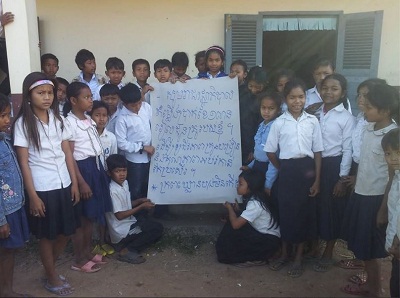



Cambodia’s main opposition party on Friday held its first public rally since a violent government crackdown on protests last week, saying it would push ahead with demands for Prime Minister Hun Sen’s resignation and calling his government “illegitimate.”
Cambodia National Rescue Party (CNRP) leaders Sam Rainsy and Kem Sokha met with some 1,000 supporters at the party’s provincial headquarters in Siem Reap, the country’s third-largest city.
The rally was the CNRP’s first since nearly a week ago, when security forces violently dispersed party supporters from Freedom Park in the capital Phnom Penh where they had been holding daily protests calling on Hun Sen to quit and to hold new elections following disputed polls last year.
Also last week, police shot dead four people and wounded 40 others during a crackdown on a strike by garment workers that was backed by the CNRP in the outskirts of the city, drawing criticism from the United Nations and rights groups.
“This government is so brutal. The government killed its own people,” Sam Rainsy said at the rally.
“This is an illegitimate government. We must have a re-election," he said.
The government has defended its crackdown and issued summonses to Sam Rainsy and Kem Sokha to appear in court on Tuesday on charges of inciting social unrest.
The two leaders reiterated their demands for an independent investigation into July 28 polls following allegations of fraud and other irregularities, failing which the government should call for fresh elections.
They said re-election is a key solution to the political deadlock that has dogged the kingdom for the last six months, during which the CNRP has boycotted parliament, claiming it was robbed of victory in the polls.
Kem Sokha said at the rally that the CNRP was the “true winner” of the July polls and that the party “adheres to democratic principles” and “respects the will of the people.”
Restarting demonstrations
Sam Rainsy and Kem Sokha are on a tour of Siem Reap, Battambang, and Banteay Meanchey provinces until Sunday to drum up support for further rallies, vowing to restart mass demonstrations by the end of the month.
The Ministry of Interior meanwhile warned the party not to violate the law on peaceful demonstration.
“We [authorities] respect rights to protest, but the protest must comply with the law,” ministry spokesman Khieu Sopheak said.
CNRP protests in recent weeks have drawn tens of thousands to the streets and posed a major challenge to the government alongside strikes by garment and footwear workers demanding a higher minimum salary.
